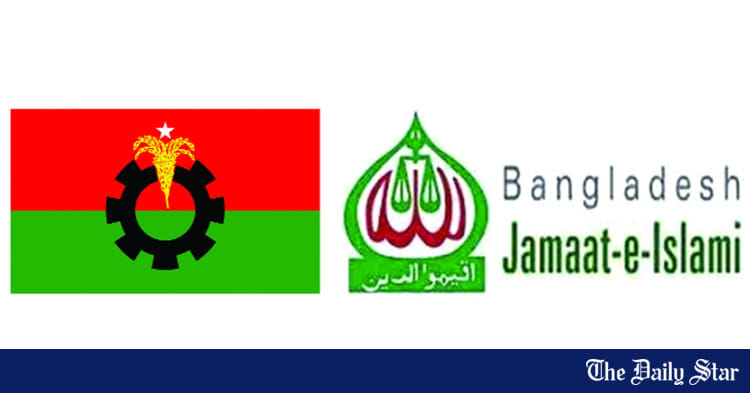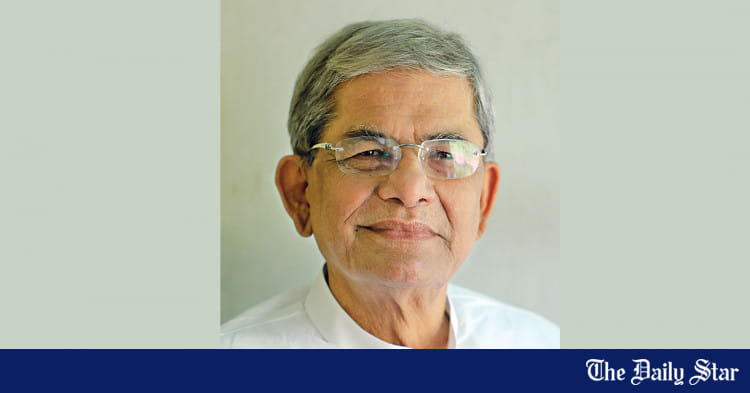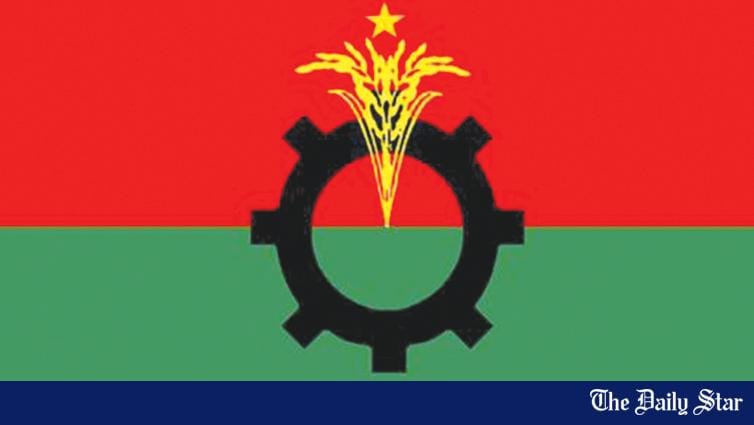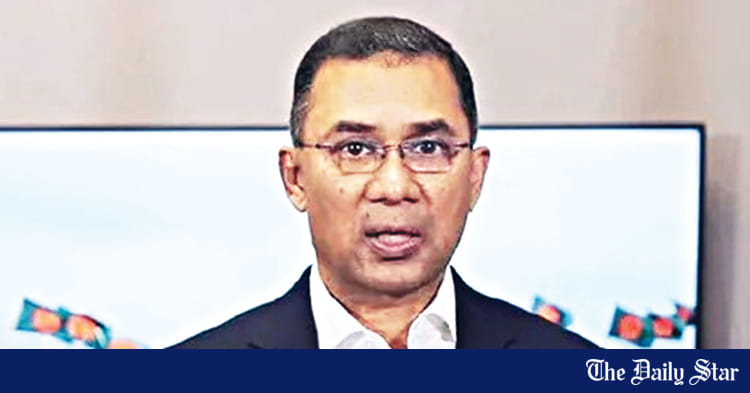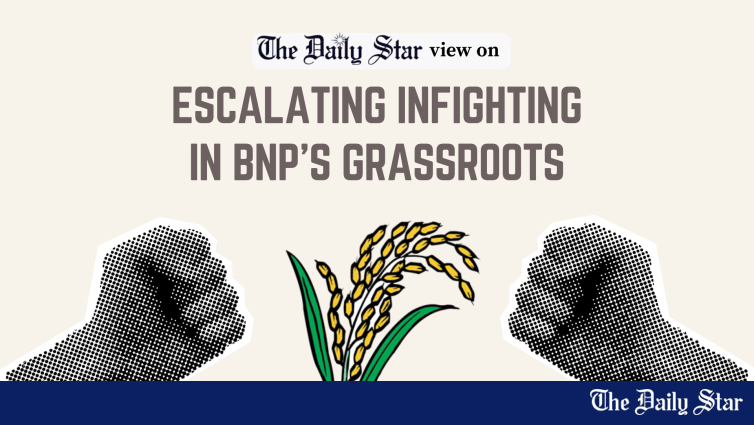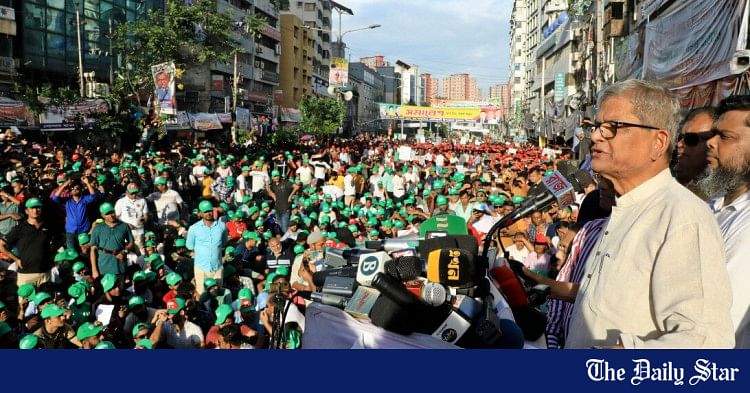Saif
Senior Member
- Messages
- 14,676
- Reaction score
- 7,646
- Origin

- Residence

- Axis Group

- Copy to clipboard
- Thread starter
- #21

Interim govt must not be allowed to fail: Tarique
Stating that the current interim government must not be allowed to fail, Bangladesh Nationalist Party acting chairman Tarique Rahman on Tuesday said that Bangladesh would advance to the...
 www.newagebd.net
www.newagebd.net
Interim govt must not be allowed to fail: Tarique
Staff Correspondent 17 September, 2024, 19:30

The Bangladesh Nationalist Party holds a public rally in front of its Nayapaltan central office in the capital marking International Day of Democracy on Tuesday. | New Age photo
Stating that the current interim government must not be allowed to fail, Bangladesh Nationalist Party acting chairman Tarique Rahman on Tuesday said that Bangladesh would advance to the election roadmap along with the path of reforms.
‘Some activities of this government may not be considered as a success by all. But we all have to remember that the failure of this government is the failure of all of us and the failure of the pro-democracy people of Bangladesh. So this interim government can in no way be allowed to fail,’ he said while virtually addressing a rally.
The party arranged the rally marking International Day of Democracy in front of the party’s Naya Paltan central office presided over by its secretary general Mirza Fakhrul Islam Alamgir.
Tarique, however, said that the current government must also be careful so that it did not fail on its own account.
He mentioned that the BNP launched a 31-point programme back in 2023 for bringing reforms to the state.
But those 31 points were not the last word regarding reform, he continued, the BNP believed that reforms in any field of the state or politics were a continuous and ongoing process.
Therefore, his party welcomed those changes also that were even more necessary than its own 31-point reform programme, Tarique said, adding that even if someone thought that more new political parties were needed for a better and safer Bangladesh, there was nothing wrong with that.
‘In the end, there are the people who will decide who to support or not to support. For this reason, the BNP has repeatedly emphasised the right of the people to vote,’ he added.
He said that the interim government was working to restore order in the country following the fall of Sheikh Hasina’s fascist and despotic regime.
Calling Hasina the head of the mafia clique, the BNP acting chairman said that though the fallen prime minister fled the country, their beneficiaries and evil forces continued to challenge the interim government from within the administration or hiding behind a façade of politics.
‘The people will not allow the government to fail amid various provocations from home and abroad,’ the BNP leader said, adding that the current interim government is the outcome of the supreme sacrifice of thousands of martyrs and the mass uprising of millions of people.
He urged his party people to earn the trust and admiration of people through their work.
‘I would like to say that the country will be on the electoral roadmap along the path of reforms. So, let us all earn the trust and love of the people through work. We should stand by the people and keep them with us,’ he said, adding that the reform programmes need to be carried forward keeping in mind the goal of establishing an accountable government, and a parliament formed by representatives elected by the people.
Tarique stated that without political empowerment and direct involvement of the people in the reform process, no democracy or reform is sustainable and effective.
Political empowerment of the people can only be ensured by establishing the right of voters to elect their chosen representatives through a free, fair and impartial election, he said.
The interim government had already undertaken reforms in several areas, he said, adding that his party feared that if the interim government failed to set priorities for setting agenda, conspiratorial circles might utilise opportunities to disrupt the success of the mass uprising.
Several hundred BNP leaders and activists joined the rally, triggering several hours of heavy traffic jams across different roads and alleys over a large area in the capital.
Staff Correspondent 17 September, 2024, 19:30
The Bangladesh Nationalist Party holds a public rally in front of its Nayapaltan central office in the capital marking International Day of Democracy on Tuesday. | New Age photo
Stating that the current interim government must not be allowed to fail, Bangladesh Nationalist Party acting chairman Tarique Rahman on Tuesday said that Bangladesh would advance to the election roadmap along with the path of reforms.
‘Some activities of this government may not be considered as a success by all. But we all have to remember that the failure of this government is the failure of all of us and the failure of the pro-democracy people of Bangladesh. So this interim government can in no way be allowed to fail,’ he said while virtually addressing a rally.
The party arranged the rally marking International Day of Democracy in front of the party’s Naya Paltan central office presided over by its secretary general Mirza Fakhrul Islam Alamgir.
Tarique, however, said that the current government must also be careful so that it did not fail on its own account.
He mentioned that the BNP launched a 31-point programme back in 2023 for bringing reforms to the state.
But those 31 points were not the last word regarding reform, he continued, the BNP believed that reforms in any field of the state or politics were a continuous and ongoing process.
Therefore, his party welcomed those changes also that were even more necessary than its own 31-point reform programme, Tarique said, adding that even if someone thought that more new political parties were needed for a better and safer Bangladesh, there was nothing wrong with that.
‘In the end, there are the people who will decide who to support or not to support. For this reason, the BNP has repeatedly emphasised the right of the people to vote,’ he added.
He said that the interim government was working to restore order in the country following the fall of Sheikh Hasina’s fascist and despotic regime.
Calling Hasina the head of the mafia clique, the BNP acting chairman said that though the fallen prime minister fled the country, their beneficiaries and evil forces continued to challenge the interim government from within the administration or hiding behind a façade of politics.
‘The people will not allow the government to fail amid various provocations from home and abroad,’ the BNP leader said, adding that the current interim government is the outcome of the supreme sacrifice of thousands of martyrs and the mass uprising of millions of people.
He urged his party people to earn the trust and admiration of people through their work.
‘I would like to say that the country will be on the electoral roadmap along the path of reforms. So, let us all earn the trust and love of the people through work. We should stand by the people and keep them with us,’ he said, adding that the reform programmes need to be carried forward keeping in mind the goal of establishing an accountable government, and a parliament formed by representatives elected by the people.
Tarique stated that without political empowerment and direct involvement of the people in the reform process, no democracy or reform is sustainable and effective.
Political empowerment of the people can only be ensured by establishing the right of voters to elect their chosen representatives through a free, fair and impartial election, he said.
The interim government had already undertaken reforms in several areas, he said, adding that his party feared that if the interim government failed to set priorities for setting agenda, conspiratorial circles might utilise opportunities to disrupt the success of the mass uprising.
Several hundred BNP leaders and activists joined the rally, triggering several hours of heavy traffic jams across different roads and alleys over a large area in the capital.

